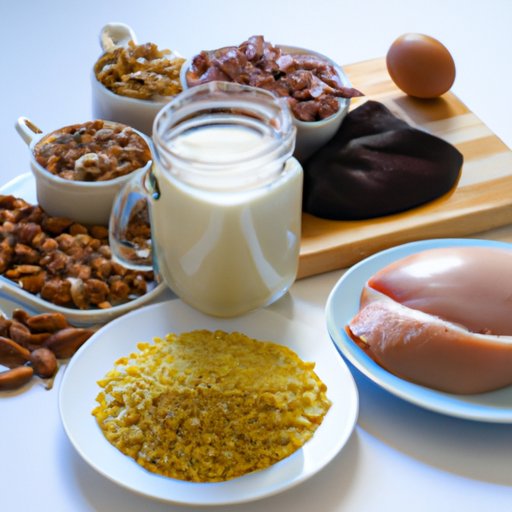Introduction
Protein is an essential nutrient that plays a crucial role in the body’s growth, development, and overall health. It’s important to ensure that you’re consuming enough protein every day in order to stay healthy and maintain optimal physical and mental performance. But with so much conflicting information out there, it can be difficult to know exactly how much protein you should be eating.
Overview of Protein Intake
Protein is one of the three macronutrients (the other two being carbohydrates and fats) that provide the body with energy. It also helps build and repair cells, muscles, and tissues and helps create hormones and enzymes. Protein is found in a wide variety of foods, including meat, dairy, eggs, nuts, beans, and legumes.
Definition of Protein
Proteins are made up of amino acids, which are the building blocks of life. There are 20 different types of amino acids, nine of which are considered “essential” because they must be obtained from food sources. The remaining 11 are “non-essential” because they can be produced by the body.

Benefits of Eating the Right Amount of Protein
Eating the right amount of protein can help you maintain a healthy weight, reduce the risk of chronic diseases, and increase muscle mass. It can also help keep your bones strong, boost your immune system, and promote better sleep. Additionally, protein can help you feel full longer, which can help with weight management.
A Nutritionist’s Guide to Protein Intake
Now that you know the basics, let’s take a look at how much protein you should be eating each day. This guide will help you understand your body’s protein requirements and how to make sure you’re getting enough.
How Much Protein Should You Eat Per Day?
The recommended daily allowance (RDA) for protein is 0.8 grams per kilogram of body weight. So, if you weigh 70 kilograms (154 pounds), you should aim to consume 56 grams of protein per day. To put this into perspective, a 4-ounce serving of chicken breast contains about 30 grams of protein.
Understanding Your Body’s Protein Requirements
Your body’s protein needs depend on several factors, such as age, activity level, and health status. For example, if you’re an athlete or regularly engage in strenuous physical activity, you may need more protein than the average person. People who are pregnant or breastfeeding may also require more protein than usual. Talk to your doctor or a nutritionist to determine the best protein intake for your individual needs.
Protein Requirements for Different Age Groups
Children and adolescents have different protein requirements than adults. The RDA for children aged 1–3 is 13 grams per day, while children aged 4–8 should have 19 grams per day. Adolescents aged 9–13 should consume 34 grams of protein per day, and those aged 14–18 should aim for 46 grams per day. The RDA for adults aged 19 and over is still 0.8 grams per kilogram of body weight.
Conclusion
Protein is a vital nutrient that plays an important role in the body’s growth, development, and overall health. Eating the right amount of protein can help you maintain a healthy weight, reduce the risk of chronic diseases, and increase muscle mass. It’s important to understand your body’s individual protein needs and ensure that you’re getting enough each day. Talk to your doctor or a nutritionist if you have any questions about your protein intake.
In summary, eating the right amount of protein can have many health benefits, including promoting weight management, reducing the risk of chronic diseases, and increasing muscle mass. The RDA for adults is 0.8 grams per kilogram of body weight, while children and adolescents have different protein requirements. Talk to your doctor or a nutritionist to determine the best protein intake for your individual needs.
(Note: Is this article not meeting your expectations? Do you have knowledge or insights to share? Unlock new opportunities and expand your reach by joining our authors team. Click Registration to join us and share your expertise with our readers.)
